Cash-Out Refinances
When are they a good idea?

Are you thinking of refinancing your home? Refinancing can be a great way to secure a lower interest rate and save yourself money over time. It can also be a good way to tap into your home's equity for other purposes. If you are thinking about refinancing, then you'll soon need to decide which type of refinancing is best for you.
One common type of refinancing is called a cash-out refinance. With this type of loan, you borrow more than the amount that you still owe on your current mortgage. This equity is given to you as cash. You'll then make payments on your new, larger mortgage. Generally, banks will allow you to borrow up to 80% or 90% of your home's equity in a cash-out refinance.
When is a cash-out refinance a good idea? Here are some situations in which you should consider this type of loan.
- To make home improvements.
Many homeowners use a cash-out refinance to fund updates to their home. If you want to remodel the kitchen or bathroom, fence in the backyard, or replace the HVAC system, this is an approachable way to get financing. Although you are borrowing against your home's equity, the improvements you're making will presumably increase your home's value, too. Cash-out refinance loans generally come with a much lower interest rate than loans offered by contractors and home improvement companies. - To pay off high-interest debt.
Do you have any high-interest credit card debt or other consumer debt? A cash-out refinance could provide you a way to consolidate your debt and lower your interest rate. You'd refinance your home and use the equity to pay off the high-interest debt, leaving you with just one low-interest mortgage to pay. This could save you thousands of dollars in interest over the years, and it may also be better for your credit score. - To purchase more property.
Say you want to buy a second home, either as a rental or a second residence. If all of your money is tied up in your home equity, you may have trouble obtaining cash for the down payment. One option is to use a cash-out refinance to access the equity in your home. You would then use the money as the down payment on your second home, and you'd pay it back as you pay the mortgage on your first home. - To fund an education.
If you want to go back to school, taking out student loans is an option. However, if you have substantial home equity, a cash-out refinance may net you a better interest rate. You do, however, need to be prepared to make higher mortgage payments as soon as you take out the loan. (Student loans are not usually due for payment until six months after you graduate.)
Cash-out refinances are an excellent option for homeowners who want to borrow against their home equity while also securing a lower interest rate in the process. Keep in mind, though, that these loans come with closing costs, which are typically between 2% and 5% of the total amount borrowed. Using your home as collateral also comes with risk. If you're unable to make payments, the bank could foreclose.
If you are confident that you can make the payments and cover the closing costs, then talk to your local bank to learn more about cash-out refinancing options. This is one of the most popular types of refinances for a reason; it allows easy access to your equity.